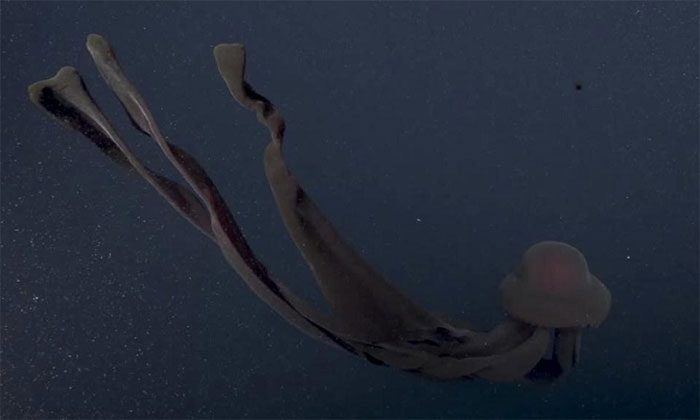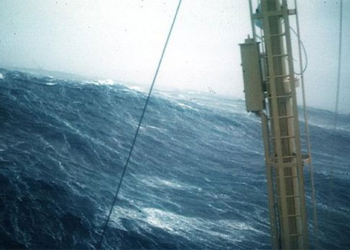Remotely operated submarines provide researchers the opportunity to observe the giant phantom jellyfish with tentacles longer than 10 meters in the deep sea.
The phantom jellyfish drifts in the dark waters. (Video: Mbari).
Biologists from the Monterey Bay Aquarium Research Institute (MBARI) captured footage of the giant phantom jellyfish (Stygiomedusa gigantea) floating underwater with its tentacles extending at a depth of 975 meters. This marks one of the nine encounters the MBARI research team has had with this elusive creature after thousands of submersible dives. “The first specimen of the giant phantom jellyfish was collected in 1899. Since then, scientists have only seen them about 100 times,” MBARI reported.
The giant phantom jellyfish is among the largest jellyfish on the planet, found in the deepest waters of all oceans except the Arctic. According to MBARI, encounters with this jellyfish species are extremely rare as they typically reside at depths beyond the reach of humans or remotely operated submarines. The bell-shaped body of the phantom jellyfish can exceed one meter in diameter, while its ribbon-like tentacles can grow longer than 10 meters.

Jellyfish are among the most common creatures in the deep sea
Researchers know little about the giant phantom jellyfish, but they believe it uses its tentacles to capture prey and funnel food into its mouth. It propels itself through the pitch-black waters of the deep sea using periodic pulses from its faintly glowing orange bell. Before deploying the remotely operated submarine used in this expedition, scientists often relied on trawl nets to catch deep-sea animals. This method is quite effective for studying certain species, but not jellyfish. MBARI noted that trawl nets are very useful for studying robust creatures like fish, crustaceans, and squid, but jellyfish tend to disintegrate into a slimy residue in the net.
Jellyfish are among the most common creatures in the deep sea. Their soft, gel-like bodies allow them to survive under extreme pressure. Previously, researchers underestimated the role of jellyfish in deep-sea ecology, but a 2017 study by MBARI revealed that they are among the most important predatory animals at great depths, competing for food with mollusks such as squid and even blue whales.





















































